I've watched 1000+ Conferences Talks over the last 20 years in Tech. I used to watch one every night after dinner for years.
Below are The 22 Talks that Impacted my Career the most ➕ my main highlights from each one.
🧵🧵🧵



Below are The 22 Talks that Impacted my Career the most ➕ my main highlights from each one.
🧵🧵🧵
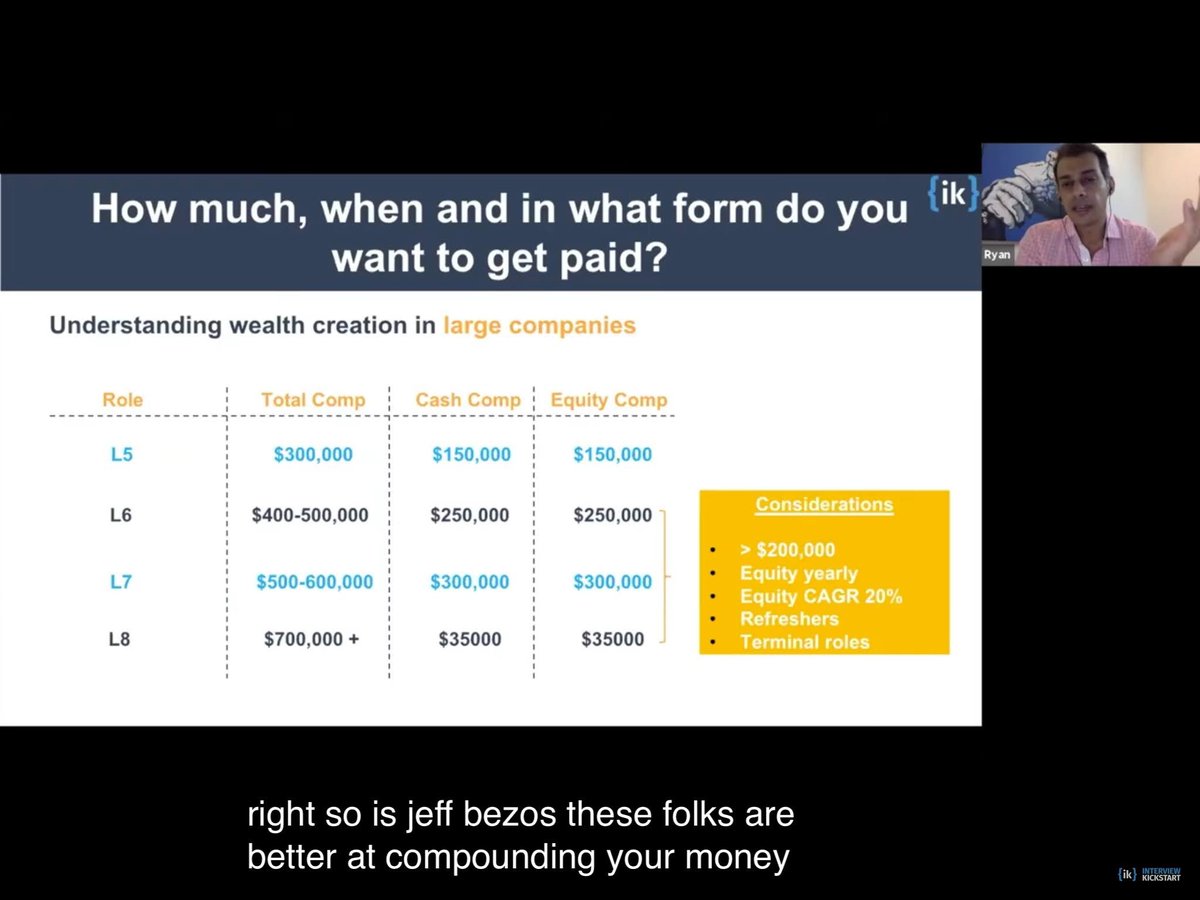


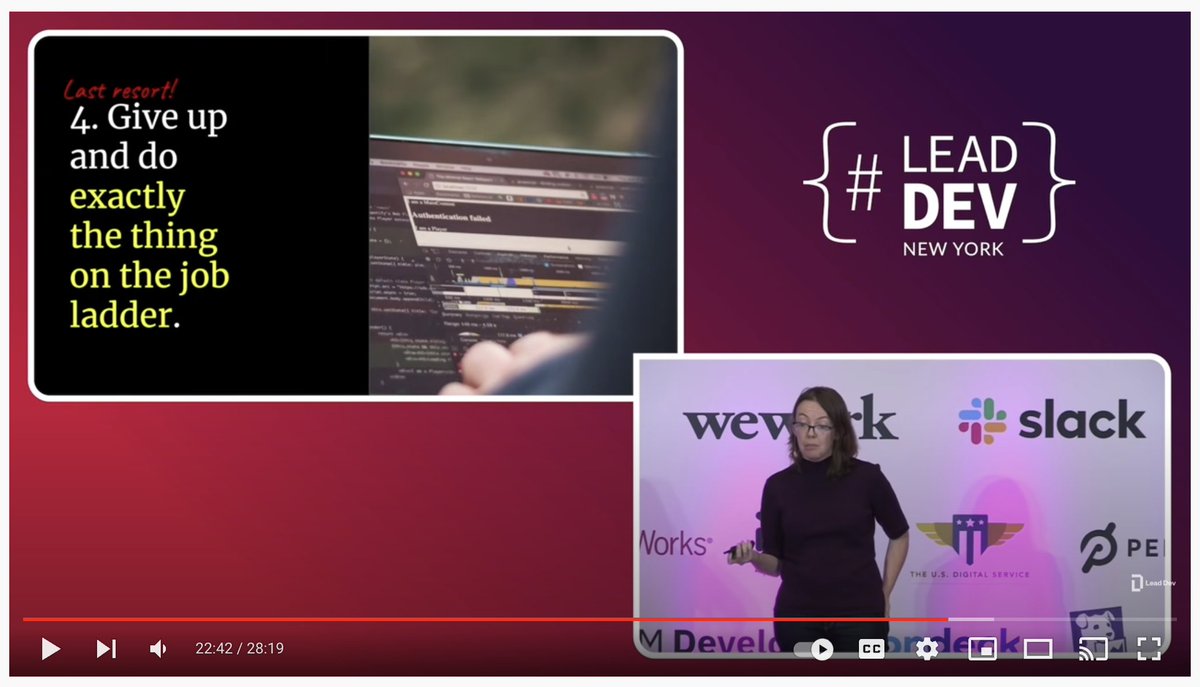
1️⃣ Øredev 2011 - Sleeping with the enemy by Gojko Adzic (@gojkoadzic)
→ Link:
"The new mission of QAs should be teach programmers to collaborate, own quality together, automate tests or checks together."
Back in 2011, this was controversial. I 💚 it.



→ Link:
"The new mission of QAs should be teach programmers to collaborate, own quality together, automate tests or checks together."
Back in 2011, this was controversial. I 💚 it.

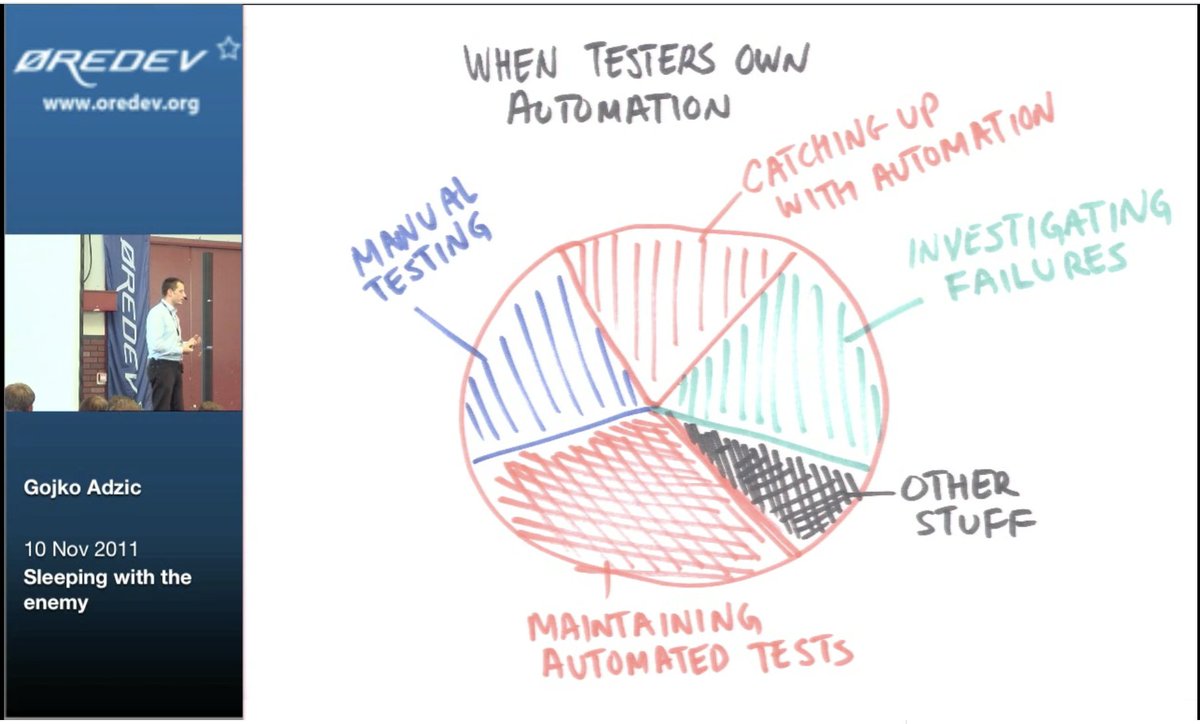


2️⃣ LKCE 2015 (Lean Kanban Central Europe) - Actionable Metrics for Predictability by Daniel Vacanti (@danvacanti)
→ Link: vimeo.com/146545310
I call Dan "The Kanban Metrics Guy". In this talk, he simplifies Little's Law so that a 5-year-old can understand it.



→ Link: vimeo.com/146545310
I call Dan "The Kanban Metrics Guy". In this talk, he simplifies Little's Law so that a 5-year-old can understand it.




3️⃣ NDC Conference 2013 - Architecture: The Lost Years by Robert Martin (@unclebobmartin)
→ Link: vimeo.com/68215570
I attended a meetup with Robert in NYC in 2014 when I had just moved here. He gave a version of this talk. All the concepts got deeply stuck with me.



→ Link: vimeo.com/68215570
I attended a meetup with Robert in NYC in 2014 when I had just moved here. He gave a version of this talk. All the concepts got deeply stuck with me.




4️⃣ GTAC 2007 - Sufficiently Advanced Monitoring is Indistinguishable from Testing by Ed Keyes
→ Link:
All concepts in there are 20 years ahead of their time.
But unfortunately, most still don't understand it.
Watch it on repeat. You will thank me.



→ Link:
All concepts in there are 20 years ahead of their time.
But unfortunately, most still don't understand it.
Watch it on repeat. You will thank me.




5️⃣ Agile Brazil 2010 - Ponha as cartas na parede, o uso eficaz do "Agile Card Wall" by Paulo Caroli (@paulocaroli)
→ Link: slideshare.net/paulocaroli/po…
Unfortunately, there are no recordings of this talk, but I remember it being awesome! Paulo is one of the best speakers I know.



→ Link: slideshare.net/paulocaroli/po…
Unfortunately, there are no recordings of this talk, but I remember it being awesome! Paulo is one of the best speakers I know.




6️⃣ LeadDevNewYork 2019 - Being Glue by Tanya Reilly (@whereistanya).
→ Link:
This is one of the most influential talks of the decade.
If you have not watched it yet, stop everything you are doing and do it now.



→ Link:
This is one of the most influential talks of the decade.
If you have not watched it yet, stop everything you are doing and do it now.


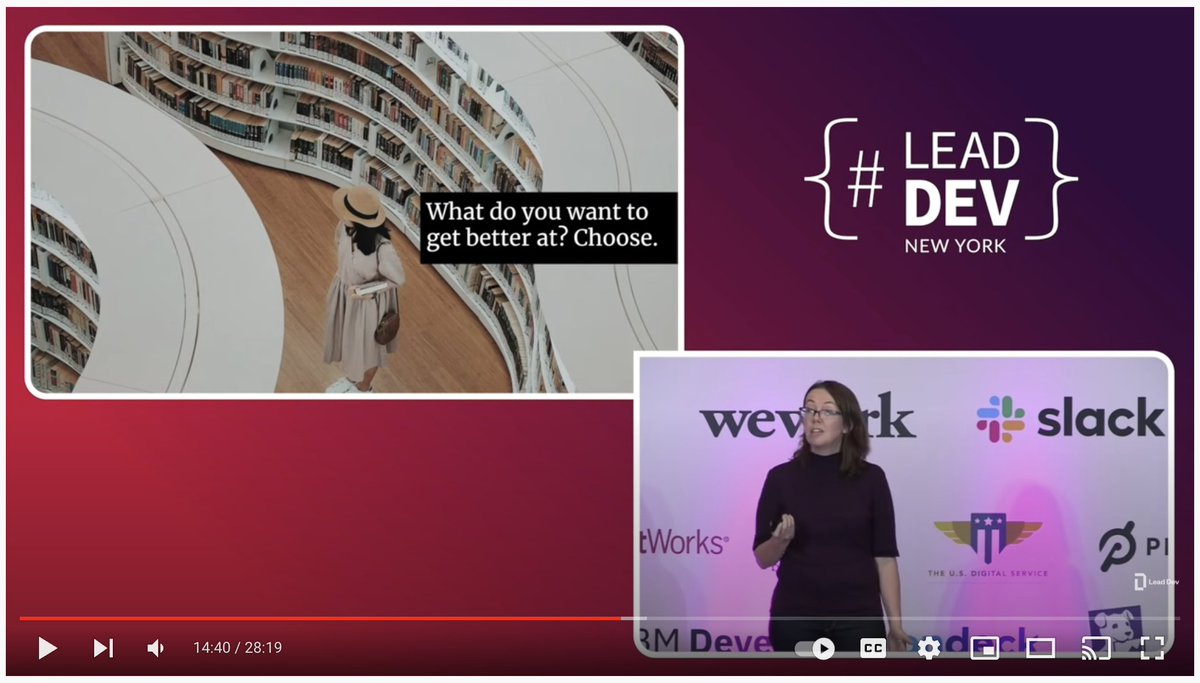
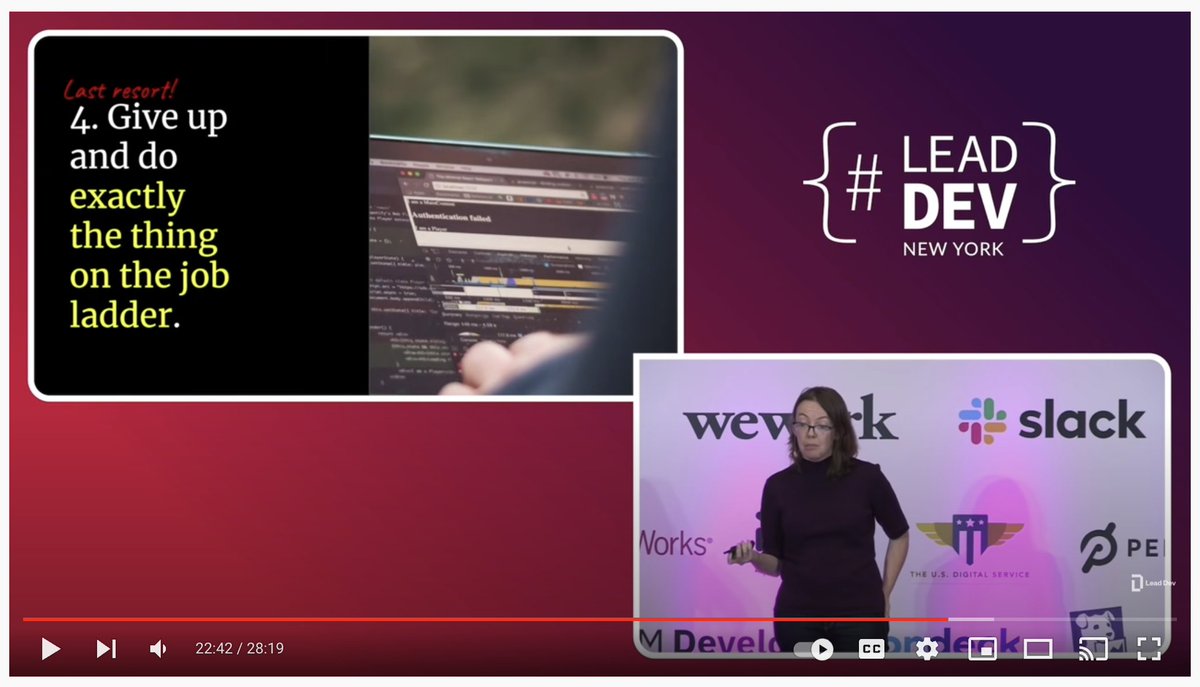
7️⃣ GOTO 2016 - 7 Secrets of Maintainable Codebases by Adam Tornhill (@adamtornhill)
→ Link:
Adam is also the author of one of my favorite books ever: Your Code as a Crime Scene.



→ Link:
Adam is also the author of one of my favorite books ever: Your Code as a Crime Scene.




8️⃣ GTAC 2011 (Google Test Automation Conference) - Test is Dead by Alberto Savoia (@pretotyping)
→ Link:



→ Link:




9️⃣ Agile Brazil 2010 - Learning and Coolness, Beyond XP (Extreme Programming) by Klaus Wuestefeld (@klauswuestefeld)
→ Link (pt-br): infoq.com/br/presentatio…
→ Link (blogpost/en): klauswuestefeld.blogspot.com/2010/07/l-lear…
Klaus presented it from a text file for 400+ people. It was awesome!
→ Link (pt-br): infoq.com/br/presentatio…
→ Link (blogpost/en): klauswuestefeld.blogspot.com/2010/07/l-lear…
Klaus presented it from a text file for 400+ people. It was awesome!
1️⃣0️⃣ RailsConf 09 - What Killed Smalltalk Could Kill Ruby, Too by Robert Martin (@unclebobmartin):
→ Link:
This has the epic Uncle Bob's Speech on Professionalism.
Many kudos to @AkitaOnRails for adding Portuguese subtitles to this back in the day.
→ Link:
This has the epic Uncle Bob's Speech on Professionalism.
Many kudos to @AkitaOnRails for adding Portuguese subtitles to this back in the day.

1️⃣1️⃣ Dev in Rio 2010 - Empreendendo uma comunidade de sucesso by Henrique Bastos (@henriquebastos).
→ Link: infoq.com/br/presentatio…
→ YTB:
This talk was the waking up call for me to create @DojoTuba - a Coding Dojo Group in Tubarão, SC, Brazil in 2011



→ Link: infoq.com/br/presentatio…
→ YTB:
This talk was the waking up call for me to create @DojoTuba - a Coding Dojo Group in Tubarão, SC, Brazil in 2011




1️⃣2️⃣ Agile on the Beach 2019 - Visualising Software Architecture with the C4 model by Simon Brown (@simonbrown)
→ Link:
Simon is also the author of the C4 Model, one of the best Architecture Models that I know, what UML was never able to be.

→ Link:
Simon is also the author of the C4 Model, one of the best Architecture Models that I know, what UML was never able to be.


1️⃣3️⃣ IK MicroClass 2020 - Strategizing Your Multimillion-Dollar Retirement Plan by Ryan Valles (@ryanvalles)
→ Link:
Along with @GergelyOrosz's article 'The Trimodal Nature of Software Eng. Salaries', this talk was eye-opening.




→ Link:
Along with @GergelyOrosz's article 'The Trimodal Nature of Software Eng. Salaries', this talk was eye-opening.
https://twitter.com/thiagoghisi/status/1520329432996663296




1️⃣4️⃣ Agile Testing Days 2012 - Reinventing Software Quality by Gojko Adzic (@gojkoadzic)
→ Link:
Make Impact, Not Software. I call this ‘The GPS Talk’.
Gojko is also author of a short book I often gift Product Managers I work with: Impact Mapping.
→ Link:
Make Impact, Not Software. I call this ‘The GPS Talk’.
Gojko is also author of a short book I often gift Product Managers I work with: Impact Mapping.
1️⃣5️⃣ Lone Star Ruby Conference 2010 - Real Software Engineering by Glenn Vanderburg (@glv)
→ Link:
Glenn and I are now co-workers at Nubank and he mentioned the latest version of his talk is much better.
→ Link (newer version):
→ Link:
Glenn and I are now co-workers at Nubank and he mentioned the latest version of his talk is much better.
→ Link (newer version):
1️⃣6️⃣ DevConFu 2013 - Integrated Tests Are A Scam by J.B. Rainsberger (@jbrains)
→ Link: vimeo.com/80533536
Along with the GOOS Book, @mfeathers's book & @thejayfields's book, it had a huge influence on me on how I approach Dealing with Legacy Codebases & Large Test Suites
→ Link: vimeo.com/80533536
Along with the GOOS Book, @mfeathers's book & @thejayfields's book, it had a huge influence on me on how I approach Dealing with Legacy Codebases & Large Test Suites
1️⃣7️⃣ GOTO 2012 - Scaling Yourself by Scott Hanselman (@shanselman)
→ Link:
Don't know How to Scale Your Impact & Influence as an Engineer (inside and outside your company)?
This talk is the best definition I found on how to be a 10X engineer.
→ Link:
Don't know How to Scale Your Impact & Influence as an Engineer (inside and outside your company)?
This talk is the best definition I found on how to be a 10X engineer.
1️⃣8️⃣ Agile 2012 - Creating Maintainable Automated Acceptance Test Suites by Jez Humble (@jezhumble)
→ Link:
→ Link:
1️⃣9️⃣ DevTernity 2017 - The Long Road by Sandro Mancuso (@sandromancuso)
→ Link:
I read Sandro’s book in 2014/2015 and many of his ideas had a huge influence on my career, especially his views around ownership, hiring and professionalism.
→ Link:
I read Sandro’s book in 2014/2015 and many of his ideas had a huge influence on my career, especially his views around ownership, hiring and professionalism.
2️⃣0️⃣ Agile India 2012 - Programmer Anarchy by Fred George (@fgeorge52)
→ Link:
I came across this talk when I was at @thoughtworks in an internal mailing list. We (myself included) were allergic to management & titles and this was challenging both.
→ Link:
I came across this talk when I was at @thoughtworks in an internal mailing list. We (myself included) were allergic to management & titles and this was challenging both.
2️⃣1️⃣ SREcon22 Americas - Principled Performance Analytics by Narayan Desai & Brent Bryan
→Link:
How a new & much simpler approach called 2-Sigma Observability can massively reduce the number of false positive alerts & uncover some undetectable issues
→Link:
How a new & much simpler approach called 2-Sigma Observability can massively reduce the number of false positive alerts & uncover some undetectable issues

2️⃣2️⃣ You Are Burned Out And Don't Even Know It by @HealthyGamerGG
→ Link:
It should be called “Debugging Burnout” and should be mandatory to all managers.
Most people that talk about burnout have no idea about what actually (scientifically) causes it.
→ Link:
It should be called “Debugging Burnout” and should be mandatory to all managers.
Most people that talk about burnout have no idea about what actually (scientifically) causes it.

Those are talks that I shared the most with peers & leaders in different companies I passed. I hope you've found this list helpful.
If you liked it, follow me @thiagoghisi for more.
And, please 🙏 Like & Retweet the first tweet below if you can to help me to spread this.
If you liked it, follow me @thiagoghisi for more.
And, please 🙏 Like & Retweet the first tweet below if you can to help me to spread this.
https://twitter.com/thiagoghisi/status/1609191119417671681
• • •
Missing some Tweet in this thread? You can try to
force a refresh


































